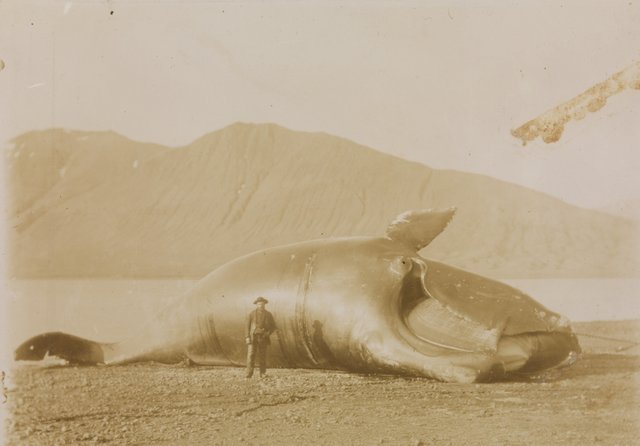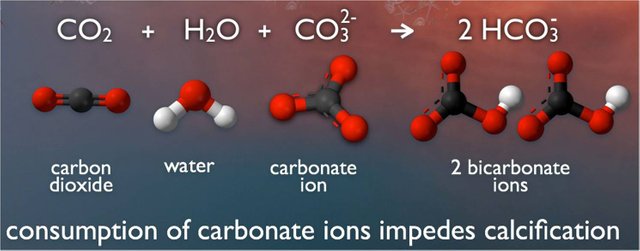Climate Change Update - Ocean Edition
Here we find just three of the most recent research stories relating to climate change and its consequences on oceanic ecosystems.
So far this season, no sightings of North Atlantic right whale calves

Eubalaena glacialis—commonly known as the North Atlantic right whale—is an endangered species of baleen whale. The species was highly sought by whalers due to its docile nature and high blubber content until the 1970s when legislation was passed to protect it in North America. Nowadays there are an estimated 450 remaining North Atlantic right whales and the species is monitored by the National Oceanic and Atmospheric Administration (NOAA), which sends planes off the coast of Georgia, USA to record right whale sightings.
Starting in november, pregnant whales head as far south as North Florida to raise their calves during the winter season. This season however, no North Atlantic right whale calves have been sighted. Breeding females are estimated to number less than 100 and fears abound that current conditions don't favor the species being able to maintain its numbers. On top of accidental deaths (being hit by ships or caught in fishing nets), climate change is believed to be having a negative impact on their food supply.
"The right whales are at a point where more are dying than are being born, that's just not sustainable long-term." concludes Clay George, a wildlife biologist with the Georgia Department of Natural Resources.
Read more here:
"Researchers Haven't Found A Single Endangered Right Whale Calf Yet This Season" at NPR
Ocean acidification and the disappearance of coral reefs
As atmospheric carbon dioxide (CO2) levels increase, so does ocean acidity. This is due to a very basic and well-established chemical reaction between atmospheric CO2 and oceanic carbonic acid (or carbonate) and water to yield bicarbonic acid (or bicarbonate). It is estimated that since the industrial revolution, ocean acidity has risen about 30%, which has been shown to adversely affect the ability to form shells of varied organisms such as corals, oysters, calcareous plankton or sea urchins, among others. But that is not all, this chemical reaction also lowers the availability of carbonates, which are a very important building material for said shelled organisms (in the form of calcium carbonate).

Now, a new study shows that ocean acidification is not only bleaching corals and preventing them from growing, but also dissolving them. This conclusion was reached after an analysis of 57 coral locations around the world by scientists working at American and Australian institutions. As calcium carbonate levels drop (as discussed above, by transforming into bicarbonates due to excess CO2), this makes it easier for the calcium carbonate present in corals to simply dissolve into the water. With higher ocean carbonate levels, the coral dissolution reaction would be in a more balanced state.
The worst part is that this dissolving effect seems to be 10 times more important than the adverse effects due to acidification itself. For now, tropical corals can still grow faster than they dissolve, but by 2080 ocean acidification levels are expected to reach a tipping point for coral biology. As University of Miami's coral expert Chris Langdon—who was not involved in this study—explained to E&E News: "We've been making projections on when reefs would get in trouble based on the sensitivity of calcification. So we might be drastically underestimating the seriousness of the problem, given that dissolution is 10 times more sensitive."
Read more here:
"Corals Are Dissolving Away" at Scientific American
Original scientific article:
"Coral reefs will transition to net dissolving before end of century" at Science
King penguins will have to relocate before the century's end or die

The king penguin (Aptenodytes patagonicus) is an upper-level predator in the southern polar ecosystem and the subject of a recent study conducted in conjunction by several European institutions. The new analysis concludes that 70% of the king penguin population, about 1.1 million breeding pairs, will have to relocate in the coming decades as a consequence of climate change.
This species of penguin has very particular breeding needs, as it prefers sea ice-free sub-antarctic islands with sand or pebble beaches to rear its chicks. On top of that, they rely on a fish- and squid-rich diet found along the Antarctic Convergence, a meeting of cold, northward-flowing Antarctic waters and warmer subantarctic waters. As the global climate warms, the Antarctic Convergence is expected to retreat further and further south, leaving the preferred nesting area of the birds too far away from their food supply.
Interestingly, the researchers also conducted a genetic analysis of the penguins and found that the species in question has survived population crashes in the past. But as Dr Céline Le Bohec, one of the study authors warns, "The problem is the pace of change. It is really very fast, and that will make it hard for the penguins to adapt."
Read more here:
"King penguins face warming challenge" at BBC News
Original scientific article:
"Climate-driven range shifts of the king penguin in a fragmented ecosystem" at Nature Climate Change
You just planted 0.60 tree(s)!
Thanks to @tychoxi
We have planted already 5564.57 trees
out of 1,000,000
Let's save and restore Abongphen Highland Forest
in Cameroonian village Kedjom-Keku!
Plant trees with @treeplanter and get paid for it!
My Steem Power = 20596.16
Thanks a lot!
@martin.mikes coordinator of @kedjom-keku
@minnowfairy has sprinkled your post with a 60.00% upvote.
Follow @minnowfairy and support our initiatives to advocate passionate Steemians delivering good, quality content to the community.